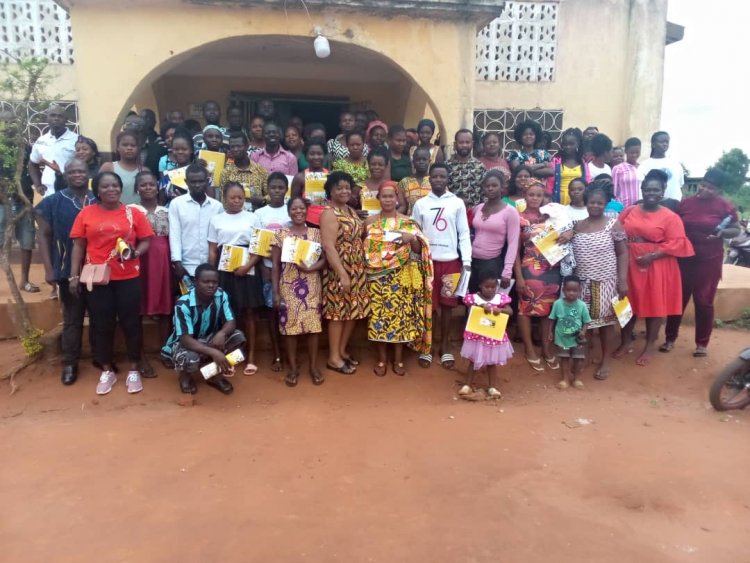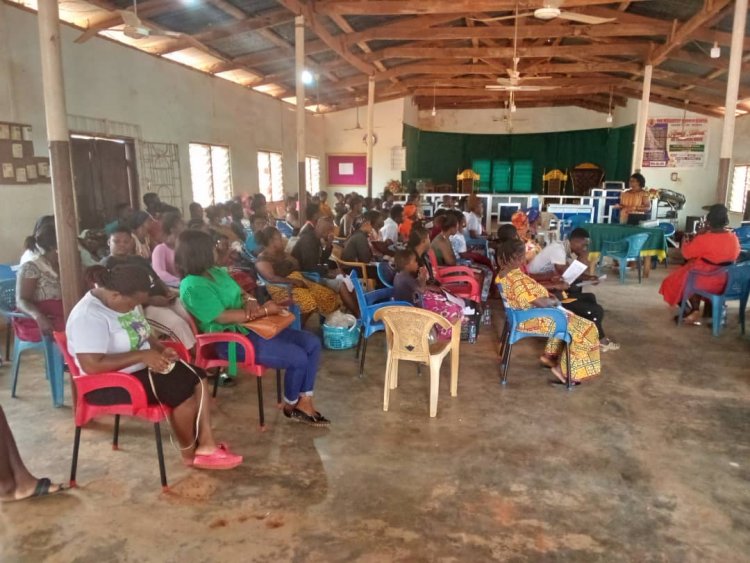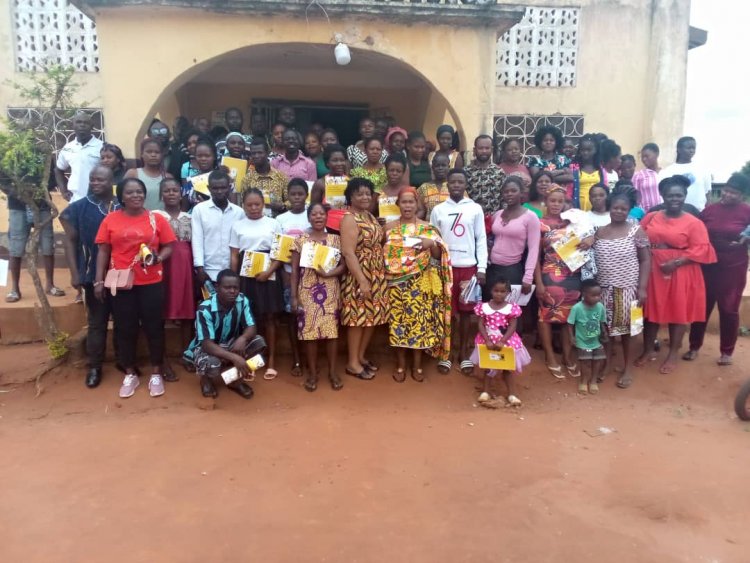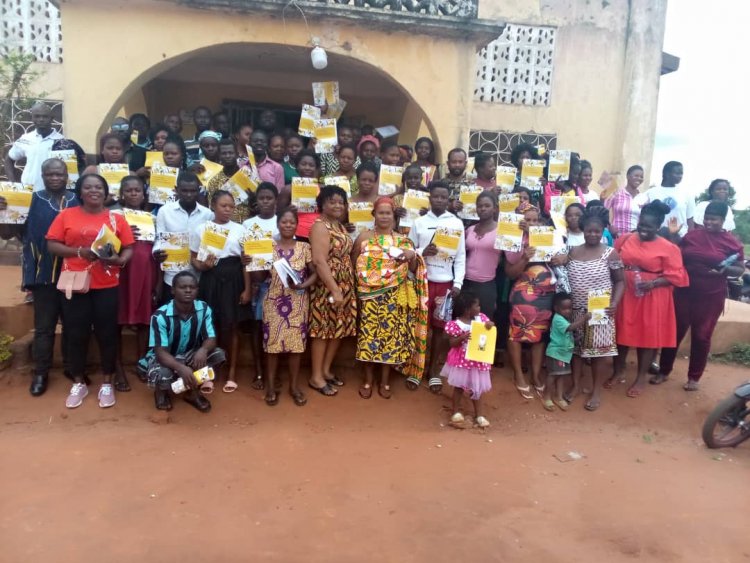Wacam, Gower Street Support Fight Against Climate Change In Nkoranza North & South
The two-day training (from Wednesday, August 9 – Thursday, August 10, 2023,), organised by Wacam with financial support from Gower Street, educated the participants on the use of the Free Prior and Informed Consent (FPIC) and the Environmental Impact Assessment (EIA) as necessary tools to minimise the effects of climate change.

Wacam, a non-governmental organisation (NGO), has equipped about 140 locals in the Nkoranza North and South Districts with knowledge on mitigating climate change and its impacts to enable them safeguard their livelihood and environment.

The two-day training (from Wednesday, August 9 – Thursday, August 10, 2023,), organised by Wacam with financial support from Gower Street, educated the participants on the use of the Free Prior and Informed Consent (FPIC) and the Environmental Impact Assessment (EIA) as necessary tools to minimise the effects of climate change.

The participants were also educated on climate change and how large scale and small scale mining companies and illegal miners were also contributing to the phenomenon.
The training was organised separately for representatives in Nkoranza North and South districts whose communities have been earmarked for mining, oil and gas exploration.

The Nkroranza North communities’ locals who benefitted from the training were Donkro Nkwanta, Bredi No. 1 & 2, Nwoase, Kyeredasu, and Asuano, while that of Nkoranza South included Busunya, Dromankese, Fiema, Bonte, Dinkra, Akrudwa No. 1 & 2 and Boabeng.
Addressing over 53 participants at Donkro Nkwanta in Nkoranza North in the Bono East Region on Wednesday, August 9, the Associate Executive Director of Wacam, Mrs. Hannah Owusu-Koranteng, explained that the FPIC concept basically meant that communities that could potentially be adversely affected by extractive industry projects had the right to access to full information and participate meaningfully in negotiations.

She went on to affirm that the FPIC principle was not a “one-off thing but a continuous process” that can effectively help tackle climate change when applied.
She said the FPIC requirement applied to both the mining and the oil and gas sectors, adding that its implementation will help reduce the quest of extractivism that overlooks the effects of climate change.
“The FPIC allows for community participation in mining decision making process,” she added.
On EIA, she said it aims at minimising negative impacts of mining projects and oil and gas exploration.
“It (EIA) involves the public in the review of the Environmental Impact Assessments (EISs) prepared by the company,” she indicated.
However, Mrs. Owusu-Koranteng bemoaned that climate change/global warming was having dire consequences on especially agriculture, adding that “we create disorder when we destroy God’s creation.”
According to her, while the operations of large and small scale mining and illegal mining operators (popularly known as galamseyers) were major drivers of climate change in Ghana, “we (making reference to Ghanaians) are also part of the problem.”
As farmers, she urged them to contribute in addressing climate change in the country by doing away with practices such as bush burning, cutting down of trees among others.
An Assistant Programme Officer of Wacam, Gabriel Togbenu, called on the participants to jealously guard the environment.
He said mining communities have not been spared of the devastating effects of climate change.
While admitting that there were natural causes of climate change, he however, stressed that the major cause of the phenomenon was human activities.
These human activities, he pointed out, have included deforestation, burning of fossil fuels, and overly application of fertilisers by farmers.
Mr. Togbenu maintained that these human activities have had significant impacts on the climate, thus causing climate change and its effects.
He recounted the 1983 drought that hit Ghana as a typical example of the impact of climate change.
On Thursday, August 10, 2023, at Busunya in the Nkoranza South District, speaking to over 80 participants, Mrs. Owusu-Koranteng stressed that one of the ways to tackle climate change in mining and oil and gas communities in the country was to avoid subjecting the public hearing component of the EIA to conditions.
Against this backdrop, she recommended that the number of public hearings be increased from one and be made a necessary requirement for particularly large scale mining in communities.
“There is a need for awareness creation in communities to be impacted by gas facilities on their rights,” she urged.
For his part, an Assistant Programme Officer of Wacam, Nana Akuoko Afari, took the participants through what climate change entails and its impacts on their communities.
He said there was a clear distinction between climate and weather, explaining that while weather was for a short term, climate on the other hand spanned over a long period.
A participant from Donkro Nkwanta, Mr. Owusu Kwaku Achieaw, thanked Wacam for the training, and called for more of such programmes for especially mining communities.
“Thanks to Wacam, I am now well informed about what climate change is all about and what I must do as a Ghanaian to minimise its effects,” he gladly expressed.
But, he warned that “if we destroy our environment we will have nothing to farm on and that will spell doom for the nation.”
Another participant from Donkro Nkwanta, Mrs. Diana Owusu, noted that hitherto she did not know anything about climate change, but that through the workshop she has learned about the phenomenon and what she must also do to mitigate it.
Bright Arhin (aka Omanhene) from Busunya in Nkoranza South noted that he has gained a lot of knowledge on climate change, hence commended Wacam for the training.
Also from Busunya, Jemima Pokua, urged locals within the area to come together and fight climate change.
Wacam gave out leaflets titled “Donkro Nkwanta community in Ghana resisting mining companies” to all participants in both Nkronza North and South.
The leaflet contains information about how residents of Donkro Nkwanta, one of the communities identified by multinationals for its gold, oil and gas potential, resisted mining.
In the face of its heavily endowed gold, oil and gas resources, the residents in the community sought assistance from Wacam to resist mining in their area.
Following the oil find in the Voltaian basin which includes communities such as Nkoranza North and South and Atebubu Amantin Districts, the Ghana National Petroleum Corporation (GNPC) has been embarking on exploratory activities on their lands.
There have also been moves by some mining companies to mine gold in the communities that fall under the Voltaian basin.
That notwithstanding, residents of Nkoranza North and South, who are mainly farmers, have made it clear that they want to remain farmers as against mining of gold and oil and gas exploration.
Their reason is that their farming is more sustainable than mining and oil and gas activities.

 Freeman Koryekpor
Freeman Koryekpor 



































